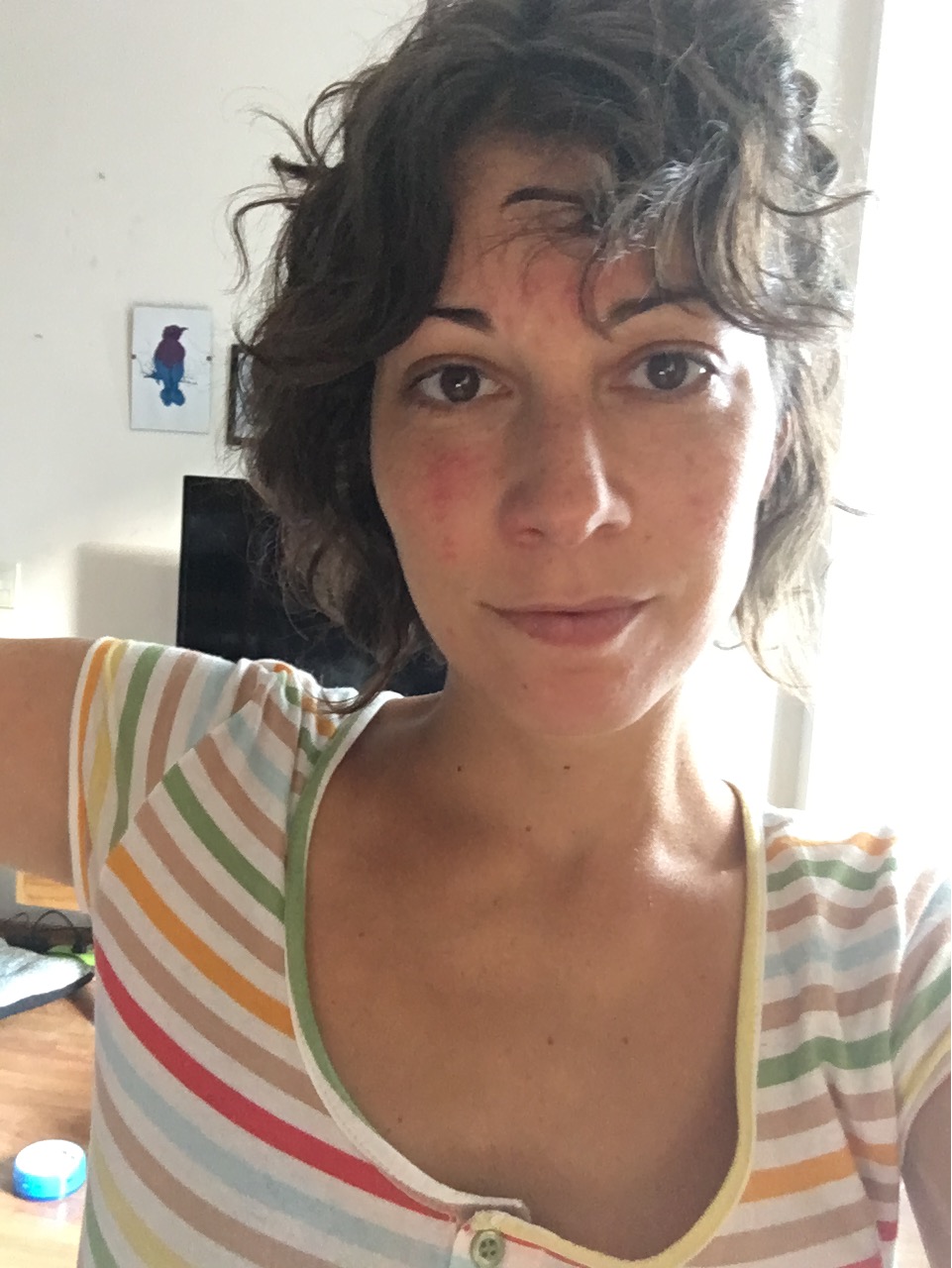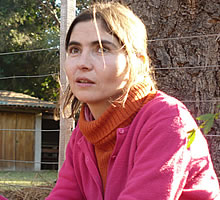The Border
The border is no man’s land
with a despondent horse
I wander around
along our path
nothing is blooming
I have my blinders in place
so nobody can tell
how scared I am of perplexity
for example my horse
makes and unmakes himself
now he is a canoe that goes down the river into the sea
to no man’s water
in the deepest parts there are pearls
fish that eat each other
but seen from here you can’t tell
if I had eyes in my back I would see things always the same
my long-tailed horse
leaves wakes of glass
so swimmers
can’t follow his tracks
he walks around
with a mask of a lone ranger
because he wants to
it’s exactly the same
on either side of the border
and I don’t understand why
we have to walk along the line
and I don’t understand why
we have to walk on the line
and I don’t understand why
my horse changes forms
and now he is a train that crosses the mountain
and now he is a king that doesn’t step on the black or the white
and now he opens a delicate umbrella
and now it’s me
carrying myself on my back
so tired.
La Frontera
La frontera es tierra de nadie
con un caballo desalmado
ando por ahí
a nuestro paso
no florece nada
llevo las anteojeras bien puestas
para que no se sepa
el terror que le tengo al desconcierto
por ejemplo mi caballo
se arma y desarma
ahora es una canoa que baja del río al mar
al agua de nadie
en lo profundo hay perlas
peces que se devoran entre sí
pero visto de acá no se nota
así tuviera ojos en la espalda vería las cosas siempre igual
mi caballo de cola larga
deja estelas de vidrio
para que las nadadores
no puedan seguir el rastro
anda
por capricho
con un antifaz de llanero solitario
es exactamente lo mismo
de un lado u otro de la frontera
y no entiendo por qué
tenemos que andar por la línea
y no entiendo por qué
tenemos que andar por la línea
y no entiendo por que
mi caballo se convierte
y ahora es un tren que cruza la montaña
y ahora es un rey que no pisa lo negro ni lo blanco
y ahora abre un paraguas delicado
y ahora soy yo misma
cargándome sobre el lomo
cansadísimo
The Cartwheel
When I was a girl
I didn’t know how to do a cartwheel
when I brought my arms to the ground
I didn’t dare
lift up my legs
I kicked lightly
like foals
as for the other girls
they all did cartwheels
some of them could cross the entire yard
doing one cartwheel
after another
they were stars
turning
turning
in the moment when your head is down
and your legs draw
a compass’ circle
your hair braises the floor
like a broom of silk
when you come up from the cartwheel
you have to rest your eyes
a few seconds
I was older when I learned to do it
in the 6th grade
I practiced in secret
I cried in secret
at once I knew
something obvious
something natural
like the first time you understand
how to float on water
you don’t have to do anything
my open body
was flying over
the surface of the earth
a brief contact
with each
of my four points
one more flower
in the spring air.
La Medialuna
Yo cuando era chica
no sabía hacer la medialuna
cuando llevaba los brazos al suelo
no me animaba
a despegar las piernas
daba pataditas bajas
como los potrillos
en cambio las otras chicas
todas hacían la medialuna
algunas podían cruzar el patio entero
haciendo una medialuna
atrás de la otra
eran estrellas
girando
girando
en el momento en que la cabeza está abajo
y las piernas dibujan
un círculo de compás
el pelo roza el piso
como una escoba de seda
cuando se vuelve de la medialuna
hay que descansar los ojos
algunos segundos
yo aprendí a hacerla de grande
en sexto grado
practicaba a escondidas
lloraba a escondidas
de pronto supe
algo obvio
algo natural
como cuando por primera vez se comprende
que para flotar en el agua
no hay que hacer nada
mi cuerpo abierto
sobrevolaba
la superficie de la tierra
un contacto veloz
con cada una
de mis cuatro puntas
una flor más
en el aire primaveral
To Arrive at the Ocean
To arrive at the ocean
in an abandoned
city
the ocean isn’t modest
in the winter
I want a dress
with those frills
the shore
barely touching
my feet
a long dress
for a late bride
when the afternoon comes
the minnows
dance on my hands
Llegar al Mar
Llegar al mar
en una ciudad
abandonada
el mar no tiene pudor
en el invierno
quiero un vestido
con esos volados
la orilla
rozándome
los pies
un vestido largo
de novia tardía
cuando cae la tarde
sobre mis manos
bailan las mojarritas

Alexis Almeida grew up in Chicago. Her poems and translations have appeared or are forthcoming in Gulf Coast, Prelude, Dusie, Pinwheel, Flag + Void, Action Yes, and elsewhere. She is an assistant editor at Asymptote and a contributing editor at The Elephants. Her chapbook of poems, Half-Shine, is recently out from Dancing Girl Press, and her translation of Florencia Castellano’s Propiedades vigiladas [Monitored Properties] is recently out from Ugly Duckling Presse. She recently spent the year living in Buenos Aires on a Fulbright research grant, where she has been compiling and co-translating an anthology of contemporary female poets living in Argentina.

Roberta Iannamico has published many books of poetry, including El zorro gris, el zorro blanco, el zorro colorado (Vox, Bahía Blanca, 1997), Mamushkas (Vox, 1999), Tendal (del Diego, Buenos Aires, 2000), El collar de fideos (Vox, 2001), Celeste perfecto (Crudo, Buenos Aires, 2005), Dantesco (Vox, 2006), Muchos poemas (Voy a salir y si me hiere un rayo, Buenos Aires, 2008), Un día nuevo (edición de autora, 2013), Nomeolvides (Vox, 2015), Qué lindo (Zindo & Gafuri 2015). She has also published various children’s books. She is a singer-songwriter, and conducts poetry workshops as well as song composition workshops for children and adults.